As cities look to rebuild their transit systems, bus rapid transit provides a cheap and effective way to expand access and boost speed.

More cities are starting to look to bus rapid transit, known as BRT, to improve their transit options and make routes more efficient, reports Ian Duncan. "The lines take the humblest form of public transit, the city bus, and supercharge it using a combination of technology, road redesigns and route planning tweaks." BRT projects "are particularly appealing in smaller urban areas and the less dense communities that dominate the American landscape where subways and light rails are hard to justify."
Some experts, however, caution that "many lines that are dubbed BRTs involve only limited upgrades to bus service. They say those kinds of lines are not likely to tame urban sprawl or lure suburban drivers out of their cars." While "[t]he most elaborate systems involve dedicated busways with stops that mimic a light-rail station and facilities to buy tickets on the street, as well as speeds that can rival rail. But many such bus lines in the United States are more basic, largely involving stops that are further apart and technology that changes stop lights to green as buses approach."
Meanwhile, "[s]ome warn that betting on a form of transit well suited to America’s road-dominated cities and suburbs could be counterproductive: an unhappy middle way that offers modestly better service and does not promote the kind of denser communities that allow transit to thrive." But "[t]here are indications that BRT lines can promote some of the density long associated with rail routes," and, in the meantime, can more effectively connect people to jobs and amenities for a fraction of the cost of rail.
FULL STORY: Cities are turning to supercharged bus routes to more quickly and cheaply expand transit services

Alabama: Trump Terminates Settlements for Black Communities Harmed By Raw Sewage
Trump deemed the landmark civil rights agreement “illegal DEI and environmental justice policy.”

Study: Maui’s Plan to Convert Vacation Rentals to Long-Term Housing Could Cause Nearly $1 Billion Economic Loss
The plan would reduce visitor accommodation by 25% resulting in 1,900 jobs lost.

Planetizen Federal Action Tracker
A weekly monitor of how Trump’s orders and actions are impacting planners and planning in America.

Federal Homelessness Agency Places Entire Staff on Leave
The U.S. Interagency Council on Homelessness is the only federal agency dedicated to preventing and ending homelessness.

Restoring Northern India’s Himalayan ‘Water Temples’
Thousands of centuries-old buildings protect the region’s natural springs and serve as community wells and gathering places.

Milwaukee to Double Bike Share Stations
Bublr Bikes, one of the nation’s most successful, will add 500 new e-bikes to its system.
Urban Design for Planners 1: Software Tools
This six-course series explores essential urban design concepts using open source software and equips planners with the tools they need to participate fully in the urban design process.
Planning for Universal Design
Learn the tools for implementing Universal Design in planning regulations.
Caltrans
Smith Gee Studio
Institute for Housing and Urban Development Studies (IHS)
City of Grandview
Harvard GSD Executive Education
Toledo-Lucas County Plan Commissions
Salt Lake City
NYU Wagner Graduate School of Public Service





























